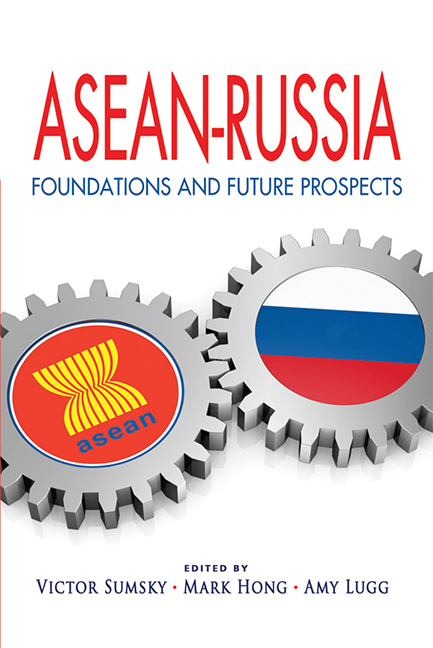Book contents
- Frontmatter
- Contents
- Foreword
- Preface
- About the Contributors
- Keynote Address
- Opening Remarks
- Keynote Address
- Introduction: Russia and the ASEAN Member States: Political and Economic Cooperation in Progress
- SECTION I WISEMEN'S VIEWS
- SECTION II GEOPOLITICS
- SECTION III BILATERAL RELATIONS
- SECTION IV Business and Economics
- SECTION V CULTURE AND EDUCATION
- EPILOGUE
- Russia's Search for an Enhanced Role in Southeast Asia
- Russia's Asian Strategy
- Index
Russia's Asian Strategy
from EPILOGUE
Published online by Cambridge University Press: 21 October 2015
- Frontmatter
- Contents
- Foreword
- Preface
- About the Contributors
- Keynote Address
- Opening Remarks
- Keynote Address
- Introduction: Russia and the ASEAN Member States: Political and Economic Cooperation in Progress
- SECTION I WISEMEN'S VIEWS
- SECTION II GEOPOLITICS
- SECTION III BILATERAL RELATIONS
- SECTION IV Business and Economics
- SECTION V CULTURE AND EDUCATION
- EPILOGUE
- Russia's Search for an Enhanced Role in Southeast Asia
- Russia's Asian Strategy
- Index
Summary
INTRODUCTION
For some Russians, economic movement towards Asia spells deviation from the European way of development and closer relations with Europe. For the past four years or so, in all sorts of analytical reports and speeches I have been criticizing Russian policy in Asia for the lack of initiative in linking this country to the Asian economic locomotives. In the meantime, the United States, Latin America and — in many respects — Europe have attached themselves to this engine quite successfully.
True, in the past eighteen months the situation has begun to improve. Both the president and the prime minister on several occasions have pointed to the need for an economic turn to Asia. The top officials of the Russian Foreign Ministry have repeatedly come out with reasonable proposals. Dozens of protocols and agreements on new projects have been signed with China. Some are already up and running — for example, an oil pipeline to the Pacific coast with a branch towards China. The construction of a pipeline has begun, a project for building a pulp and paper mill is reported to start soon, and a number of mining projects have been launched. The Trans-Siberian highway has been opened to traffic — to our dismal shame, we did not have one until just recently.
THE INTELLECTUAL INFRASTRUCTURE
Some interesting intellectual products have emerged. The Russian National Committee of the APEC has issued a report calling for Russia's new strategy 346 Sergei Karaganov in the Pacific. Well-remembered is the brilliant article “A Turn to the East” by Professor Victor Kuvaldin, an expert at the Gorbachev Foundation. The need for turning Russia towards new Asia has been recognized in chorus by some leading experts on international affairs who would seldom look eastwards, if at all, just five years ago: Fyodor Lukyanov, Vyacheslav Nikonov and Dmitry Trenin. The ice has been broken.
NEEDED: A COMPREHENSIVE ASIAN STRATEGY
Apparently, any long-term and comprehensive Asian strategy has yet to be devised. It is vital and must be linked with the strategy for the development of the entire country, and not just its Siberian and Far Eastern regions.
- Type
- Chapter
- Information
- ASEAN-RussiaFoundations and Future Prospects, pp. 345 - 355Publisher: ISEAS–Yusof Ishak InstitutePrint publication year: 2012



